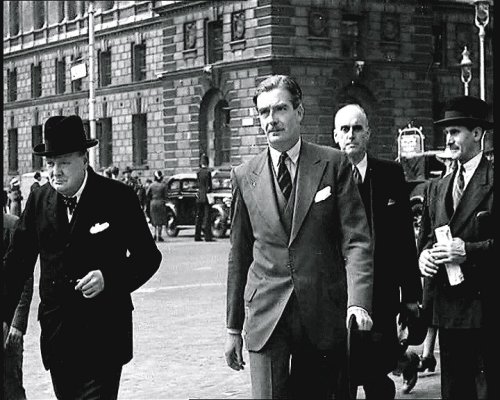Sunday 3 September 1939
 |
| Winston Churchill and other top leaders on 3 September 1939. |
Behind the scenes, the Germans are still trying to prevent the declaration right up to the last second. Their unofficial diplomat, Birger Dahlerus, remains on the phone to Whitehall from Berlin as the speech is made, attempting to broker a deal. Both Alexander Cadogan and Lord Halifax, however, remain adamant: no deal without a prior German withdrawal from Poland.
Australia Prime Minister Robert Gordon Menzies immediately confirms with his own radio address that his country also is at war with Germany. France declares war at 5 p.m. India and New Zealand follow suit. Belgium reaffirms its neutrality, with King Leopold assuming command of the Belgian Army.
British Government: Winston Churchill, a long-time war hawk now proven correct, resumes his World War I post as First Lord of the Admiralty. A Ministry of Economic Warfare (blockade) is established. The House of Commons meets on a Sunday for the first time since 1820.
Battle of Poland: While Polish radio reports nothing but victories, spiked by the welcome news that England has declared war in Poland's support, mass evacuations continue of government officials and their families from Katowice, Krakow and other threatened cities.
The Polish troops are already retreating eastward. The 1st and 4th Panzer Divisions cross the Warta River and are bombed by Polish bombers in the Radom-Plotrkow sector without much effect. The German capture Czestochowa. General Guderian's XIX Corps crosses the Polish Corridor in the north.
Stukas sink the Polish destroyer Wicher at Hela.
Battle of Britain: at 11:28 a.m., barely ten minutes after the conclusion of Chamberlain's speech, there is a false alarm of an air raid in London, with people taking to the shelters for the first time.
European Air Operations: Shortly after the declaration of war, the RAF sends a Bristol Blenheim of No. 139 Squadron out of Wyton on a mission to obtain photographic reconnaissance of the German naval base at Wilhelmshaven. It returns unscathed.
That night, 10 Whitley bombers of Nos. 51 and 58 Squadrons drop 6 million anti-German leaflets over Hamburg, Bremen and the Ruhr industrial area without incident.
Battle of the Atlantic: The German Kriegsmarine has 17 U-boats on station guarding the western approaches to Great Britain in preparation for war. Germany announces an immediate blockade. The U-boats are under orders to follow the German Prize Ordinance taken almost literally from the Naval Protocol of 1936. The Kriegsmarine interprets this to mean that U-boats are to attack all merchant ships in convoy, and all that refused to stop or used their radio upon sighting a submarine. [This is pursuant to evidence and testimony of Admiral Karl Doenitz at the Nuremberg trials following World War II.]
Having sailed the previous day from Liverpool for Montreal despite strong indications that war was about to break out, liner SS Athenia is proceeding westward as the day begins. At roughly 200 nautical miles (370 km) northwest of Ireland and 60 nautical miles (110 km) south of Rockall, U-30 under the command of Oberleutnant Fritz-Julius Lemp spots her. Mistaking her for a troopship or other armed vessel, Lemp fires two torpedoes, and one strikes on her port side toward the stern. Several ships rush to the Athenia's assistance, including, somewhat ironically, the large yacht the Southern Cross, owned by Dahlerus' boss at Electrolux, Axel Wenner-Gren. They get there well before the Athenia sinks, which takes a full 14 hours.
 |
| Sinking of the SS Athena on 3 September 1939. |
German Government: Reinhard Heydrich, in his capacity as head of the State Security Police and the Security Service, issues a decree to the heads of all police officers. The decree states in part that "Any attempt to undermine the unity of the German people and its determination to fight must be ruthlessly suppressed." It calls for the arrest of anyone that speaks out against the war, though anyone who can be straightened out through "educational means" should be treated lightly.
Nobody is pleased with Foreign Minister Ribbentrop, who had repeatedly assured Hitler that Great Britain, in particular, would never declare war over Poland. Ribbentrop falls into disfavor from which he never really recovers. Goering somewhat vicariously yells at him: "Now you've got your... war! You alone are to blame!"
September 1939
September 1, 1939: Invasion of PolandSeptember 2, 1939: Danzig Annexed
September 3, 1939: France, Great Britain Declare War
September 4, 1939: First RAF Raid
September 5, 1939: The US Stays Out
September 6, 1939: Battle of Barking Creek
September 7, 1939: Polish HQ Bugs Out
September 8, 1939: War Crimes in Poland
September 9, 1939: The Empire Strikes Back
September 10, 1939: The Germans Break Out
September 11, 1939: Battle of Kałuszyn
September 12, 1939: The French Chicken Out
September 13, 1939: The Battle of Modlin
September 14, 1939: Germany Captures Gdynia
September 15, 1939: Warsaw Surrounded
September 16, 1939: Battle of Jaworów
September 17, 1939: Soviets Invade Poland
September 18, 1939: Lublin Falls
September 19, 1939: Germans, Soviets Hook Up
September 20, 1939: the Kraków Army Surrenders
September 21, 1939: Romania Convulses
September 22, 1939: Joint Soviet-German Military Parade
September 23, 1939: The Panama Conference
September 24, 1939: The Luftwaffe Bombs Warsaw
September 25, 1939: Black Monday for Warsaw
September 26, 1939: Warsaw on the Ropes
September 27, 1939: Hitler Decides to Invade France
September 28, 1939: Warsaw Capitulates
September 29, 1939: Modlin Fortress Falls
September 30, 1939: Graf Spee on the Loose

No comments:
Post a Comment